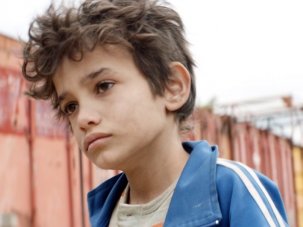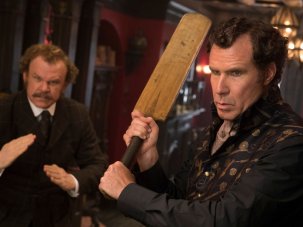
Pouring equal parts noir and blanc, with a dash of femme fatale and a twist of ingénue, our March issue raises a glass to the enigmatic Barbara Stanwyck, one of Hollywood’s most versatile actors. Inviting us through the astonishing trajectory of Stanwyck’s career is Molly Haskell, who starts the story with Stanwyck dancing for the Ziegfeld Follies as a 1920s flapper girl, making a name for herself in racy pre-Code films and then flourishing with directors like Frank Capra, Fritz Lang and Douglas Sirk into the 50s. Dipping into her key performances in The Lady Eve, Baby Face and more, Haskell dissects Stanwyck’s mercurial on-screen presence.
Posted to subscribers and available digitally 4 February
→ Buy a print edition
→ Access the digital edition
→
On UK newsstands 7 February
Unlike her contemporaries, Stanwyck was a freelance actress not bound by any studio, and her professionalism, independence and cool intelligence not only made her popular with whomever she worked, but echoed in her roles. This distinctive personality would manifest itself in characters such as go-getters, working women, loving mothers or – after the success of Double Indemnity – manipulative femmes fatales. They’re fascinating roles, which under Stanwyck’s realisation brought humour to the darkest characters and malice to the lightest. “We want the good girl, the bad girl, and everything in between,” writes Haskell. Enjoy the whole cocktail by grabbing our March issue before BFI Southbank’s Starring Barbara Stanwyck season.
Watch our March 2019 issue trailer
It’s not only the famous husky Stanwyck voice we’re celebrating this issue, but also the indelible voice of James Baldwin. His fantastic prose has finally been adapted for the first time in the English language by long-term fan and Moonlight director Barry Jenkins, who has taken his If Beale Street Could Talk and turned it into a lyrical meditation on racial injustice in 1970s Harlem. Kelli Weston sits down with the director to talk Baldwin, that Britell score and how he crafted such a sensuous mode of storytelling. “It doesn’t have to be exhibited in the dialogue for the audience to feel it,” says Jenkins.
Another director at the height of their craft is Lee Changdong, whose Burning is finally reaching UK audiences this month after setting festival audiences alight on its worldwide tour. Though it’s an adaptation of Murakami’s re-telling of a Faulkner story, Burning speaks to a very contemporary issue, one of millennial disaffection in Korea (and byeond) thanks to the insidious nature of employment in the gig economy. “There are problems in society that we don’t necessarily perceive or can’t quite put our finger on,” Changdong tells James Bell.
An impassioned Nadine Labaki is also deeply concerned about today’s youth, imploring Pamela Hutchinson: “If you want to solve evil in the world, you take care of the children.” Her latest feature, Capernaum, speaks for those children who don’t have a voice: victims of child trafficking, child labour and early marriage. Coaxing incredibly rich performances from such young, street-cast actors, her story about a Lebanese boy suing his parents for bringing him into this world is an intimate tale that relates to the living hell millions of children endure worldwide.
Finally, before extended reviews of the Melissa McCarthy-Richard E. Grant vehicle Can You Ever Forgive Me? and Abdellatif Kechiche’s latest Mektoub, My Love, we take time to remember the filmmakers, writers and actors who left us in 2018. Celebrating the film culture that they shaped and the legacies they leave behind, we have expanded obituaries on Penny Marshall, Nelson Pereira Dos Santos, Mrinal Sen and William Goldman – and you can find more 2018 obituaries online here.
Turn to Home Cinema and read our thoughts on Julia Roberts’ noirish Amazon Prime series Homecoming, and reviews of two new collections of DVDs that celebrate Early Women Filmmakers. In our Books section, Christina Newland pores over The Sopranos Sessions – the new definitive tome on HBO’s iconic series, 20 years after its pilot aired.
And still there’s more, including a chat with Sara Colangelo, who directs the Maggie Gyllenhaal-starring The Kindergarten Teacher; a focus on the essential work of Native American experimenter Sky Hopinka; Tony Rayns’ detailing of an upcoming Straub-Huillet retrospective; and why the ending of the second film in Kieslowski’s Three Colours trilogy is so significant.
Pick up a copy and you’ll find even more surprising delights to fuel you for a month.
Features
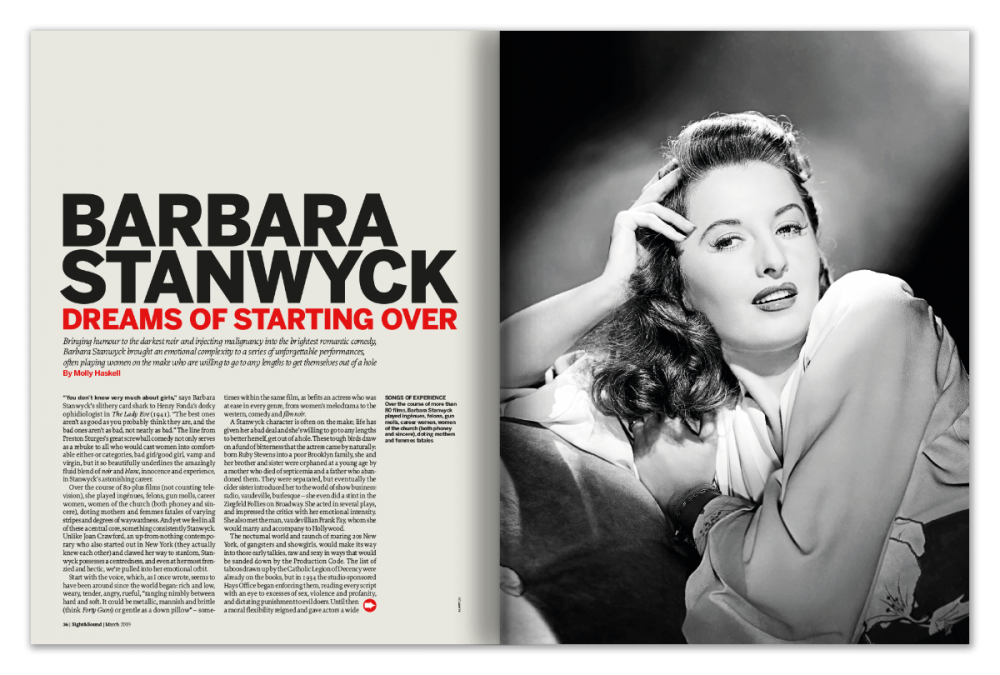
Dreams of Starting Over
Bringing humour to the darkest noir and injecting malignancy into the brightest romantic comedy, Barbara Stanwyck brought an emotional complexity to a series of unforgettable performances, often playing women on the make who are willing to go to any lengths to get themselves out of a hole. By Molly Haskell.
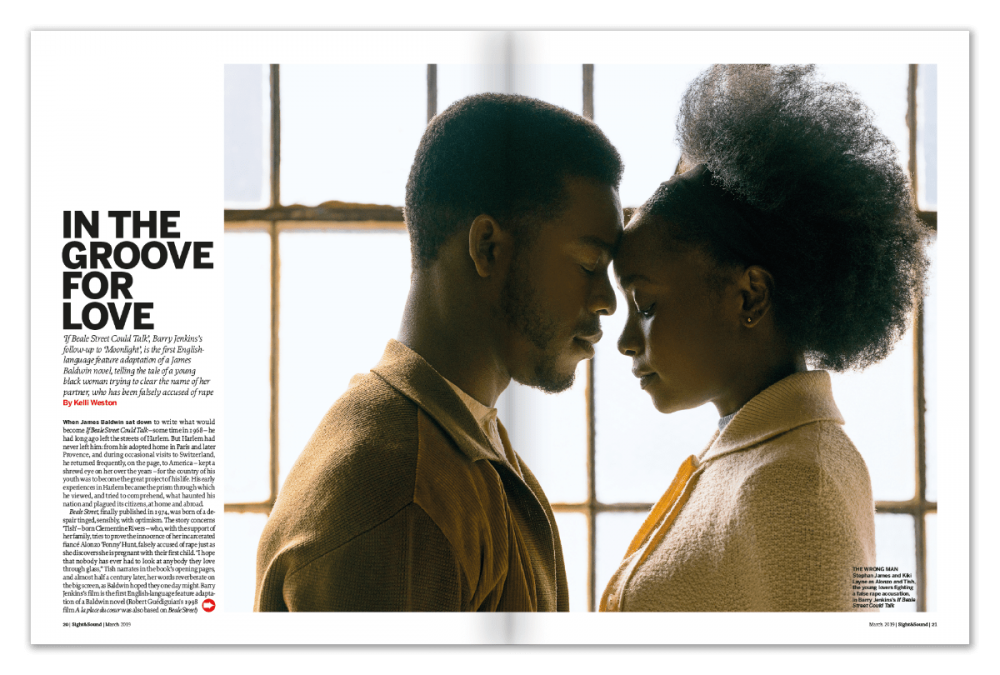
In the Groove for Love
If Beale Street Could Talk, Barry Jenkins’s follow-up to Moonlight, is the first English-language feature adaptation of a James Baldwin novel, telling the tale of a young black woman trying to clear the name of her partner, who has been falsely accused of rape. By Kelli Weston.

Playing with Fire
An aspiring writer adrift in a world of meaningless part-time jobs falls under the spell of a young woman and a mysterious, wealthy stranger in Burning, Lee Changdong’s enigmatic portrait of millennial life in contemporary Korea. By James Bell.
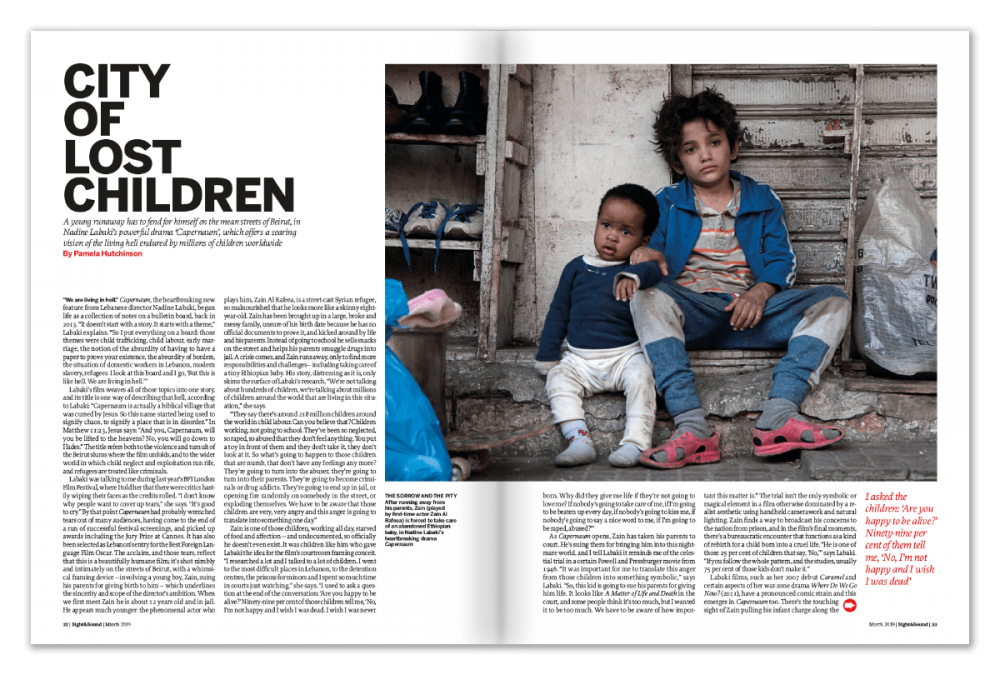
City of Lost Children
A young runaway has to fend for himself on the mean streets of Beirut in Nadine Labaki’s powerful drama Capernaum, which offers a searing vision of the living hell endured by millions of children worldwide. By Pamela Hutchinson.
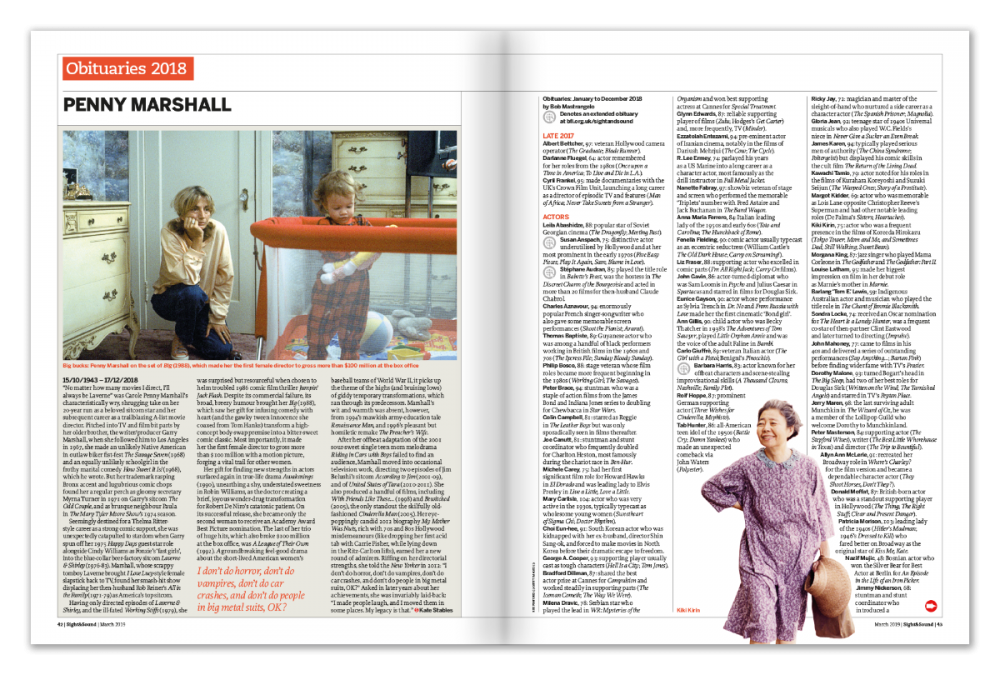
2018 Obituaries
Bob Mastrangelo honours the great and the good of the film world who left us last year, with brief overviews of the lives of Penny Marshall, Nelson Pereira dos Santos, Mrinal Sen and William Goldman.
Regulars
Editorial
Hidden Lights and Sue Bruce-Smith
Rushes
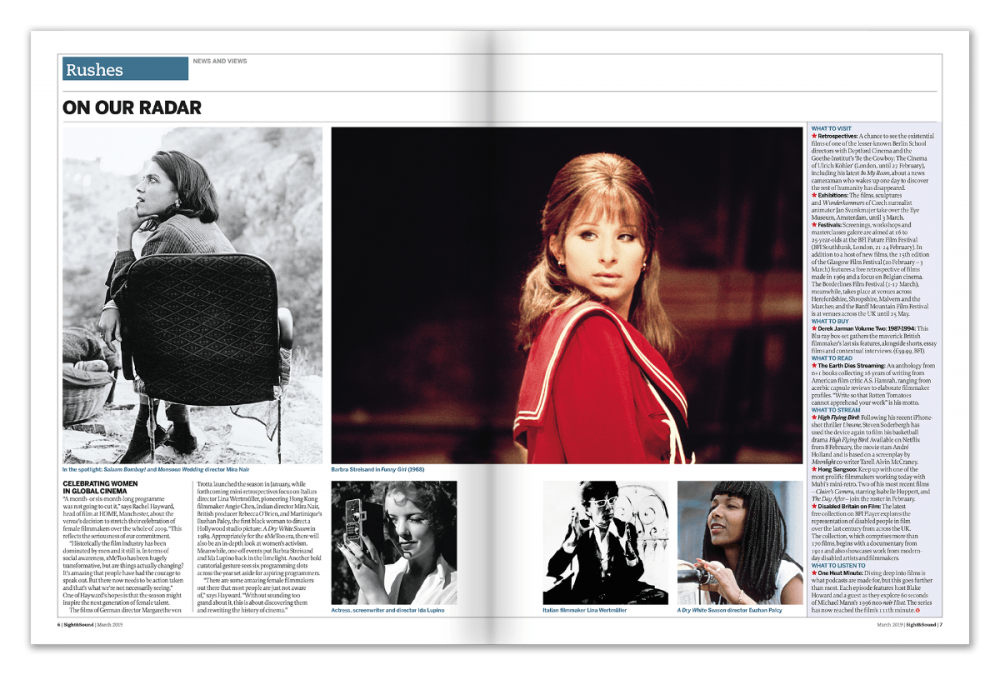
On our Radar
On our radar
A minute-by-minute podcast on Michael Mann’s Heat, the new Derek Jarman box-set, Ulrich Köhler at Deptford cinema, and a year of celebrating women in global cinema at Manchester’s HOME.
Rediscovery
A selection of ‘lost’ works from the Japanese colonial period in Korea offers some fascinating insights into the country’s film history. By Tony Rayns.
Dream palaces: Gartenbaukino, Vienna
A critic’s fond recollections of nights spent at the former HQ of the Austrian Horticultural Society. By Neil Young.
The numbers: Free Solo
Dogwoof’s vertiginous rock-climbing documentary has been scaling giddy new heights at the box office. By Charles Gant.
Interview: Sara Colangelo
Sara Colangelo’s The Kindergarten Teacher is alive to the pressures of motherhood, in a tale of a woman obsessed by a child prodigy. By Beth Webb.
Wide angle
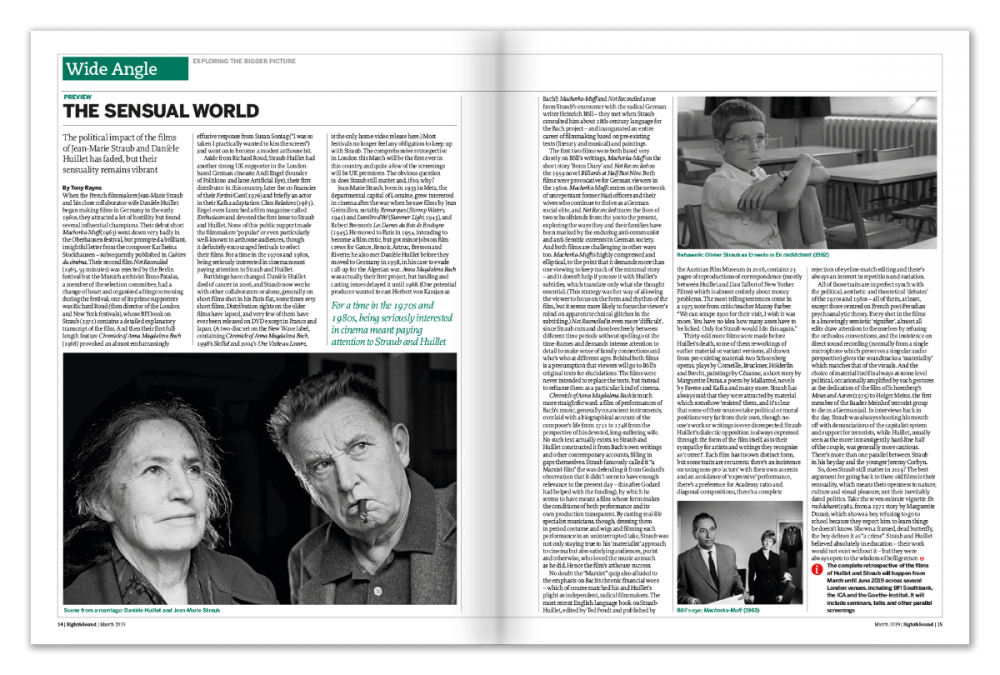
The Sensual World
Preview: The sensual world
The political impact of the films of Jean-Marie Straub and Danièle Huillet has faded, but their sensuality remains vibrant. By Tony Rayns.
Primal screen: Not strictly for the Byrds
John S. Robertson’s name lives on in a 60s song about being forgotten and sneered at. Now his films are being rediscovered and admired. By Neil Young.
Artists’ moving image: Always Here
The Native American filmmaker Sky Hopinka explores language, place and memory using a poetic film language that is all his own. By Elena Gorfinkel.
Reviews
Films of the month
Can You Ever Forgive Me?
Green Book
Mektoub, My Love
plus reviews of
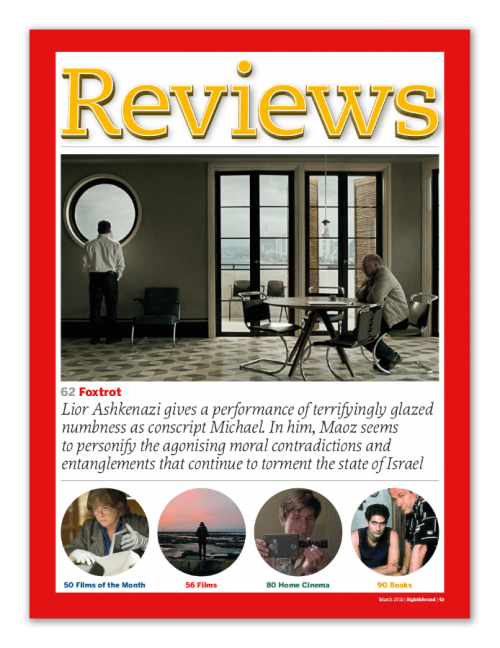
Our Reviews section
All Is True
América
Aquaman
Boy Erased
Bumblebee
Burning
Capernaum
Creed II
Escape Room
Foxtrot
Glass
Hannah
Holmes & Watson
The House by the Sea
If Beale Street Could Talk
Instant Family
Jellyfish
Love Sonia
Mary Poppins Returns
The Mule
Of Love & Law
One Cut of the Dead
One Nation, One King
On the Basis of Sex
A Private War
Sauvage
Sometimes Always Never
Spider-Man: Into the Spider-Verse
Teddy Pendergrass: If You Don’t Know Me
The 12th Man
Vice
Welcome to Marwen
Home Cinema features
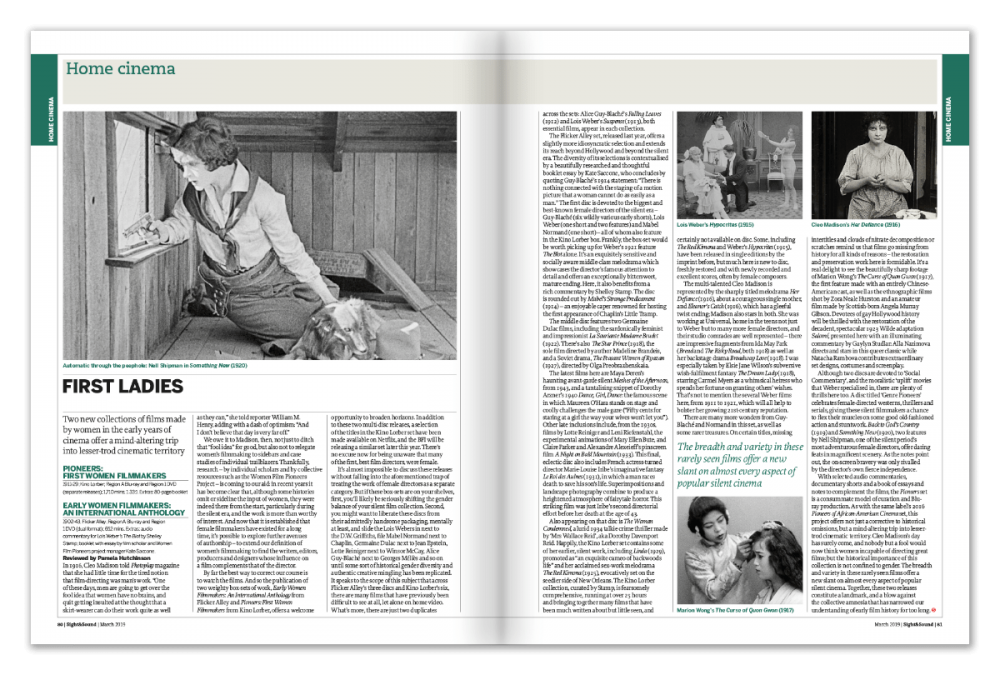
Our Home Cinema section
First Ladies: Pioneers: First Women Filmmakers + Early Women Filmmakers: An International Anthology
Two new collections of films made by women in the early years of cinema offer a mind-altering trip into lesser-trod cinematic territory. By Pamela Hutchinson.
Revival: The Professional
A series of new restorations shows off the range of Julien Duvivier’s filmmaking, and the depth of his craftsmanship. By David Thompson.
Rediscovery: Collective conscience
The Berwick Street Film Collective didn’t just make political films – it made films politically. This new release shows what that meant. By Henry K. Miller.
plus reviews of
Atoll K
Bob & Carol & Ted & Alice
De Niro & De Palma: The Early Films
Deadbeat at Dawn
Hallelujah The Hills
Hush… Hush, Sweet Charlotte
FIlms By Ishuii Teruo
Khartoum
Television: Rogue Male
Peter O’Toole is far more convincing than Walter Pidgeon, the leading man in Fritz Lang’s version; and at least early on, he is more plausibly ravaged.
Streaming: Daydream Believer…
‘Trust no-one’ is the lesson of the noirish Homecoming, starring Julia Roberts as a case-worker at a shady facility for disturbed military vets. By David Thomson.
Books
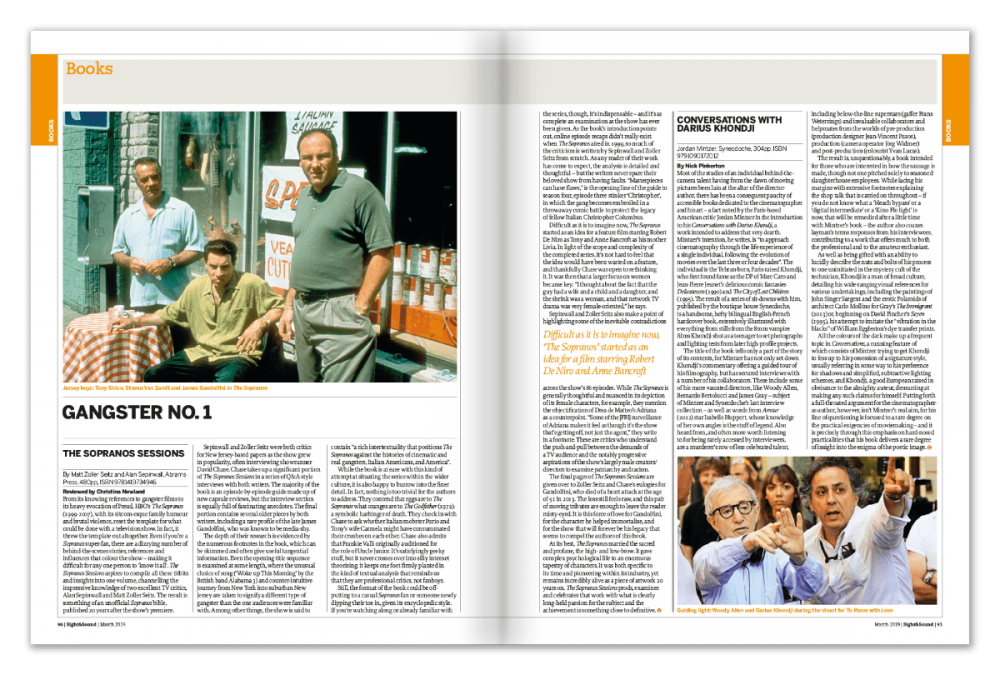
Our Books section
The Sopranos Sessions by Matt Zoller Seitz and Alan Sepinwall (Abrams Press) reviewed by Christina Newland
Conversations with Darius Khondji by Jordan Mintzer (Synecdoche) reviewed by Nick James
Fine Cuts: Interviews on the Prace of European Film Editing by Roger Crittenden (Focal Press/Routledge) reviewed by Michael Brooke
Who Is Michael Ovitz? by Michael Ovitz (WH Allen) reviewed by Stephen Phillips
Letters
Rock Hudson’s sensitivity
New insights into John M. Stahl’s filmography
Turning our end-of-year poll upside down
The development of Alfonso Cuarón’s representations
Silent cinema on the UK’s screens, or lack thereof
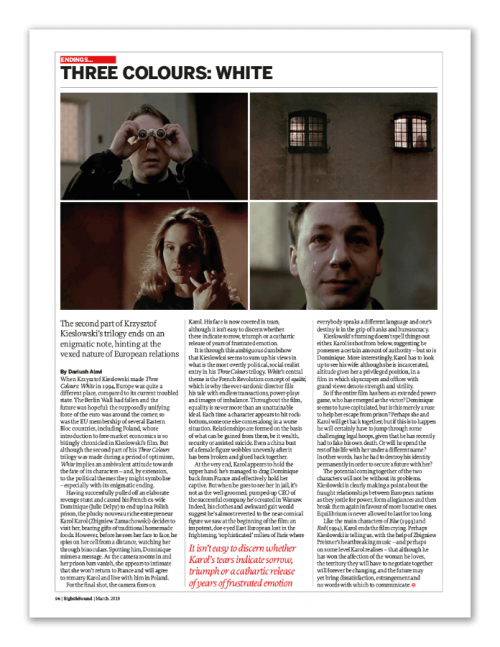
Endings
Endings
Three Colours: White
The second part of Krzysztof Kieslowski’s trilogy ends on an enigmatic note, hinting at the vexed nature of European relations. By Dariush Alavi.
Further reading
-
The Digital Edition and Archive quick link
Log in here to your digital edition and archive subscription, take a look at the packages on offer and buy a subscription.






